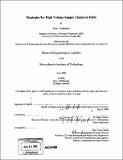| dc.contributor.advisor | Edgar Blanco. | en_US |
| dc.contributor.author | Palathinkal, Don J | en_US |
| dc.contributor.other | Massachusetts Institute of Technology. Engineering Systems Division. | en_US |
| dc.coverage.spatial | a-ii--- | en_US |
| dc.date.accessioned | 2009-04-29T17:14:18Z | |
| dc.date.available | 2009-04-29T17:14:18Z | |
| dc.date.copyright | 2008 | en_US |
| dc.date.issued | 2008 | en_US |
| dc.identifier.uri | http://hdl.handle.net/1721.1/45245 | |
| dc.description | Thesis (M. Eng. in Logistics)--Massachusetts Institute of Technology, Engineering Systems Division, 2008. | en_US |
| dc.description | Includes bibliographical references (leaves 87-89). | en_US |
| dc.description.abstract | There are a lot of growth opportunities for multinational companies in emerging markets. These markets have a large consumer base but the market conditions in these regions are novel to these multinational companies. Various strategies evaluating government regulations, sales, marketing and supply chain have to be analyzed, isolated and implemented so that companies can quickly adapt to new market conditions. The purpose of this thesis is to review successful supply chain strategies adopted by multinationals catering to a large number of consumers in India. Based on the review, the thesis recommends insights for developing supply chains in emerging markets. To accomplish this, various strategies and literature on supplier, manufacturer and distributor partnerships were evaluated, compared and contrasted. Interviews with key management personnel across the supplier-manufacturer horizon were also conducted to gain insider perspective and information pertaining to supply chain issues. Current literature and public documents available have shown that successful supply chain strategies involved unique partnerships between local competitors and entering multinationals and also partnerships between local governments and direct source. Examples that stand out are the partnerships between PepsiCo and farmers in the state of Punjab, India or those of Project Shakti between women entrepreneurs from rural India and Hindustan Lever. This thesis recommends that such partnerships may hold the key to entering new markets in order to merge together different professional cultures without the risk of losing substantial investments in infrastructure. In addition, it also recommends the advantages of vertical integration for emerging markets like India. In addition, the findings on fragmentation within the echelons of supply chains propose opportunities for understanding developmental barriers. | en_US |
| dc.description.statementofresponsibility | by Don J. Palathinkal. | en_US |
| dc.format.extent | 89 leaves | en_US |
| dc.language.iso | eng | en_US |
| dc.publisher | Massachusetts Institute of Technology | en_US |
| dc.rights | M.I.T. theses are protected by
copyright. They may be viewed from this source for any purpose, but
reproduction or distribution in any format is prohibited without written
permission. See provided URL for inquiries about permission. | en_US |
| dc.rights.uri | http://dspace.mit.edu/handle/1721.1/7582 | en_US |
| dc.subject | Engineering Systems Division. | en_US |
| dc.title | Strategies for high volume supply chains in India | en_US |
| dc.type | Thesis | en_US |
| dc.description.degree | M.Eng.in Logistics | en_US |
| dc.contributor.department | Massachusetts Institute of Technology. Engineering Systems Division | |
| dc.identifier.oclc | 310124083 | en_US |
